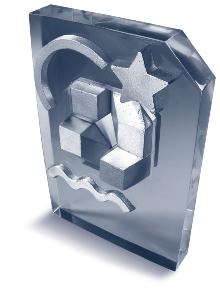 |
|||
|
|
|
|
|
 |
|||
|
|
|
|
|

Science
Awards for Excellence – Submit Your Candidate!
"Excellence:
The fact or condition of excelling; superiority; surpassing goodness, merit,
etc."
Do
you know someone that fits that description? Maybe a scientist who
is changing lives for the better? Or a teacher who is expanding minds
and inspiring students toward science careers? The Carnegie Science
Center's Awards for Excellence (formerly the
Science
and Technology Awards) is your opportunity to see that their achievements
are recognized. And, as Pittsburgh continues to grow as a center for science,
technology, and research, you shouldn't have to look far for an eligible
candidate. Presented in cooperation with the Pittsburgh Technology Council,
this annual event aims to raise public awareness about science and its
applications in our daily lives. Since 1997, the awards have emphasized
the vital link between schools, research, laboratories, business development,
and job creation in the region and society at large.
Ten
awards will be given for outstanding achievement in the following categories:
Forms
for candidates may be obtained by calling 237-3353 or can be submitted
online at http://www.pghtech.org.
Entries must be postmarked by Monday, January 8, 2001. A panel of professionals,
including past winners from related fields will judge submissions. Winners
will be notified February 19-23, 2001, will receive a $1,000 cash prize
to be applied to a scientific project, and will be feted at an awards banquet
at the Pittsburgh Hilton, April 4, 2001.
Enjoy
Winter at the Omnimax The
Rangos Omnimax movie Alaska features all the magic and majesty of the Last
Frontier, including a breathtaking Aurora Borealis sequence. But what
Click here for
answers. NEXT
STOP BROOKVILLE You
CAN go home again. This November--the 80th anniversary of the Carnegie
Science Center's popular Miniature Railroad & Village--several pieces
from the original exhibit will be loaned permanently to Brookville, Pennsylvania's
Jefferson County Historical and Genealogy Society. The pieces, which will
be displayed in Brookville's Brady Craig Museum (located in the town's
historic district), were created by Brookville native Charles Bowdish for
his holiday display. Bowdish transported his much-loved display to Pittsburgh
in 1954, when the "hobby"--and the crowds wanting to see it--grew too large
for his home.
"The
people of Brookville look at the railroad as 'the one that gotaway,'" says
Patty Everly, MRR&V program coordinator.
It
has yet to be determined how many pieces will be loaned--although Mike
Orban, MRR&V manager, says, "more than 10 and less than 100. The pieces
will include replicas of houses, stores, and the octagonal barn located
a few miles outside of Brookville. "I wanted to take some of Charlie's
work out of deep storage, and put it on display where people can see it,"
Orban says. "Brookville was the natural place for them, and I think
he would be pleased to see his work return to his hometown."
"It
was a piece of the town's history that was missing," says Randy Bartley,
president of the Jefferson County Historical and Genealogy Society. "It's
been one of those 'you don't know what you have until it's gone' kind of
things."
|
|
|
|
|
|
|
All rights reserved. E-mail: carnegiemag@carnegiemuseums.org |
|||